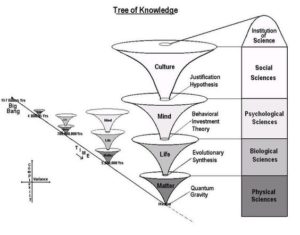Psychology Needs a Periodic Table of Behavior by Gregg Henriques Ph.D.
Psychology needs a Periodic Table of Behavior : Gregg Henriques Ph.D.
“The Tree of Knowledge System offers the field of psychology (and science in general) a metaphysical system from which to operate. Specifically, it offers a clear: (a) cosmology; (b) ontological map of key categories in nature; and (c) epistemological framework for knowledge acquisition.”Modern science took off during the Enlightenment and changed the world. Science differed from philosophy in that it did not presuppose how nature must be, as the early philosophers tended to do, but instead scientists “got up out of their armchairs” and asked questions and gathered data about how the universe actually behaved. Observation, measurement, and experimentation became the sine qua non of the scientific enterprise, and this has continued into the present day.
Science has been so successful that philosophy has drifted into the background, so much so that some scientists (e.g., E. O. Wilson) have wondered if philosophy is even necessary. This love of empiricism was soaked up by scientific psychologists. In his popular Psych 101 text, David Myers states that “the key word in psychology’s definition is science” and that psychology “is less a set of findings than a way of asking and answering questions”, meaning that psychologists approach their subject matter through the lens and methods of empirical science.
What is the problem with this? The problem that emerges is that there is no general framework for understanding the concepts and categories under investigation. Consider physics. Prior to Newton, physics was a “pre-paradigmatic mess”, meaning that the concepts and categories that physicists were using were highly inconsistent. One of the great achievements of Newtonian science was the emergence of a shared definitional system that could be examined empirically. Notice the first part of this sentence. A shared definitional system. That is a key aspect of cumulative science. And it is something physics, chemistry, and biology largely have achieved, at least at the core of the discipline. That is, scientists from these disciplines know generally what matter, energy, electrons, neutrons, genes, cells, evolution and so forth “mean”. And this shared, clear definitional system is one of the decisive factors that makes them worthy of the name “science”.
Psychology completely lacks a shared definitional system. There is NO agreement on terms like behavior, mind, cognition, self, consciousness, and the like. And, with its focus on empiricism, psychology will not achieve such an understanding because observation and experiment alone are not enough to define these terms. What is needed is a holistic map that allows investigators to consider the concepts and categories that are used for understanding.
The concepts and categories that one uses to map reality is one’s metaphysical system. The Periodic Table of the Elements is a metaphysical system. It offers a map of the elements, lining them up into different categories. It is a map that is supported by empirical work, but the map itself is metaphysical in nature.
Psychology needs a metaphysical system for understanding as much as it needs empirical research. Without advances in achieving a shared metaphysical system, psychology will continue to exist as a “collection of studies” that offer interesting glimpses into the human condition, but not deep understanding.
The Tree of Knowledge System offers the field of psychology (and science in general) a metaphysical system from which to operate. Specifically, it offers a clear: (a) cosmology; (b) ontological map of key categories in nature; and (c) epistemological framework for knowledge acquisition.

-
-
-
-
/ 0 Comments